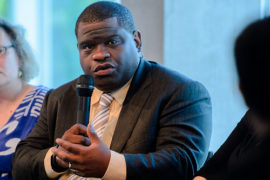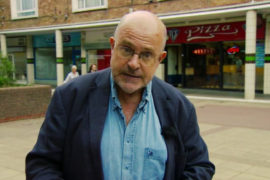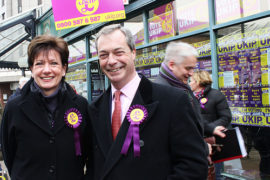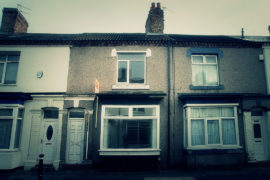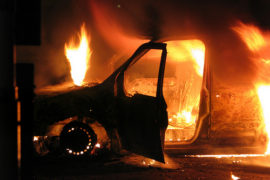BBC programmes have given a platform for claims that Nigel Farage has ‘blood on his hands’ for Harlow killing – despite local police warning against ‘jumping to conclusions’ about a ‘race hate’ angle.
In Harlow, six teenagers have been arrested and bailed on suspicion of killing a 40-year-old Polish man who was mortally injured in attack in the town centre on Saturday.
At this stage, very little is known about the crime other that frequent disturbances involving youths have recently been reported in the town centre. Local police say they are following up a number of inquiries.
DCI Martin Pasmore, of Essex police, has said: “The widespread media are reporting this as a hate crime, but that is no more than one line of many inquiries that we’re following. We must not jump to conclusions – let us do the investigation and get the facts right.”
It seems clear from the statement that police, if anything, were playing down the ‘race hate’ angle, – it was only one possibility among many.
That, however, has not stopped the BBC speculating strongly on those lines. The full transcripts of three reports, one on the BBC1 News at Six, the other on BBC2’s Newsnight, and the third on the Today programme on Thursday morning are below so that can readers can form their own judgments about the Corporation’s approach.
In the first account reporter Daniel Sandford stressed in the intro the angle that police thought the attack may have been racially motivated, and then specifically stated:
“The fear is that this was a frenzied racist attack triggered by the Brexit referendum.”
In the Newsnight report, presenter Evan Davis and reporter John Sweeney both strongly stressed the ‘post-Brexit’ nature of the crime and then comment from an alleged friend of the victim was included. This man, Eric Hind, claimed that the Brexit vote had given the green light for British people ‘to do what they want to’.
Then, towards the end, Sweeney said:
In Harlow tonight people united for a vigil, but for the town’s Polish community the killing of one of their own makes emotions raw.
ERIC HIND: (fragment of word, unclear) I don’t know if I can mention names but I mean . . .
JS: Mention names.
EH: But I mean, Nigel Farage, I mean, thank you for that, because you are part of this death, and you’ve got blood on your hands, thanks to you, thanks for all your decision, wherever you are, er . . . yeah, it’s your call.
JS: Nigel Farage has always denied this allegation. As the search for clues and answers continues, the fear is that two poisons have come together to a lethal result.
To be fair to Sweeney, his report also contained comment from local people that youths in the town centre had been behaving badly for some time, and there was local concern that police had not done enough to intervene. So there was some balancing material.
But the main thrust of his report was that this looked strongly to be a post-Brexit race hate crime that was part of a huge national trend – and he gave a platform for the victim’s ‘friend’ to say that Nigel Farage had blood on his hands. Sweeny pointed out that Farage denied ‘such accusations’ but his commentary suggested that the ‘out’ side in the referendum campaign had unleashed ‘twin poisons’.
In the third report, on Today’s business news, reporter Dominic O”Connell spoke to the deputy Polish prime minster about efforts he was making to boost investment from the UK and the City of London into Poland. Towards the end, he asked two questions:
“Now Britain, of course, has a large Polish population, do you expect some of them might want to return home after the Brexit vote?”
“And tragically, we had a Polish man attacked and killed in Harlow in Essex on Saturday, do you fear actually that some Poles might be motivated to return simply because they fear the Brexit vote has stirred some racist feeling against them?”
He thus also deliberately linked the Harlow killing to post-Brexit race hate against the Poles.
Overall the three reports, despite the police’s warning about jumping to conclusions, seem to have strongly inflated the race-hate angle, to the extent that it was treated as the main point. Further, in a recorded news report, John Sweeney gave someone an open goal to attack Nigel Farage as the person responsible. The person making the claims, may or may have not known the victim, and may or may not have had other motives for making such a specific, sweeping attack.
But this was of no account. This was highly irresponsible journalism that (as is reported elsewhere on News-watch) fits with the Corporation’s overall strongly negative approach to the Brexit vote and to Nigel Farage.
Transcript of BBC1, News at Six, 31st August, Polish Man Murdered, 6.22pm
FIONA BRUCE: Five 15-year-old boys and a 16-year-old have been arrested on suspicion of killing a Polish man in Harlow in Essex. Arkadiusz Jóźwik who was 40 was left with fatal head injuries after an unprovoked attack on Saturday night. Police suspect it may have been racially motivated. The Polish ambassador to the UK has visited the scene. Our home affairs correspondent Daniel Sandford’s report contains some distressing details.
DANIEL SANDFORD: On his first day in the job, Poland’s new ambassador to Britain found himself laying flowers, mourning one of his countrymen – a man murdered while eating a pizza in what may have been a racist attack. This was compounded by that an alleged friend of the victim
ARKADY RZEGOCKI Polish Ambassador: I’m really shocked and deeply concerned on this, on this tragedy. It’s a great tragedy, not only for Polish community but also for, for British community.
DS: Arkadiusz Jóźwik was 40, he and two friends were attacked just before midnight on Saturday. Alerted by one of the men who survived, the manager of the pizza takeaway, who didn’t want us to use his name, told us he was the first to find Arkadiusz as he lay dying.
PIZZA TAKEAWAY MANAGER: He was on the floor and on his side, it’s . . . a lot of thick blood coming out of his left ear on the floor, and very thick, it’s clumped up really. And . . . you could see that it’s . . . it’s really dangerous, he’s badly hurt.
DS: The fear is that this was a frenzied racist attack triggered by the Brexit referendum. But while detectives aren’t ruling that out, it may be that Arkadiusz Jóźwik wasn’t targeted because of his race, but simply because he was there when a group of youths was looking for trouble. People in The Stow shopping precinct said that teenagers had been causing havoc here all summer, and not just harassing Polish people. But worrying it could be a hate crime, the local MP made this appeal.
ROBERT HALFON MP Conservative, Harlow: We need to be a kind and decent nation and we shouldn’t allow . . . people who come from the sewers to exploit divisions.
DS: As people mourn, detectives are pouring through CCTV footage, and have arrested six teenagers, but all have since been released on police bail. Daniel Sandford, BBC News, Harlow.
Transcript of BBC2, Newsnight, 31st August, Polish Man Murdered, 10.44pm
Introduction
EVAN DAVIS: Also tonight: a Polish man beaten to death in Essex, could it be the latest example of hate crime post-Brexit? And what does it tell us about anti-social behaviour.
ERIC HIND: Well, to be honest, since the Brexit, I think, you know, all the British people, the Brits here think they’ve got green, er, green light here to do what they want to . . . you know, they feel very kind of, you know, (fragment of word, unclear) secure to . . . to be racist.
Main Report, 10.44pm
EVAN DAVIS: Now, the town of Harlow in Essex is in something of a state of shock after an attack on two Polish residents on Saturday night, they killed one of them. Arkadiusz Jóźwik died from his injuries on Monday. Five 15-year-old boys and one 16-year-old boy, all from Harlow, were arrested on suspicion of murder, all but one of them have been bailed. Now, there are obvious worries in the Polish community, in Harlow at what looks like a hate crime. The Polish ambassador was in the town today, along with the local MP, to offer support, and our reporter John Sweeney went to hear the local concerns.
JOHN SWEENEY: The killing of Arkadiusz Jóźwik, a 40-year-old Pole in Essex was a particular tragedy, and cause for a wider, more general unease about the politics of identity in Britain today. Saturday night, just before midnight, 15 or 20 youths are here, and they’re trouble. Arkadiusz the Polishman goes to that pizza restaurant behind me. His phone rings, he answers it in Polish, and that, people say, is the trigger for what happens next. The story ends with Arkadiusz down on the ground, where those flowers are there now, a dying man. For Poles in Britain, there is mounting anxiety about what happened here. Today, a very public visit from Warsaw’s man in London.
ARKADY RZEGOCKI Polish Ambassador to London: It’s the beginning of my mission in the United Kingdom, and I’m really shocked and deeply concerned on this, on this tragedy.
JS: Eric Hind knew the dead man.
ERIC HIND: Well, to be honest, since the Brexit, I think, you know, all the British people, the Brits here think they’ve got green, er, green light here to do what they want to . . . you know, they feel very kind of, you know, (fragment of word, unclear) secure to . . . to be racist, to, to, to, to, to swear, to say all kind of rude comments, or just to be sarcastic, to, to saying sarcastic comments every day at work. I’ve been there, and, you know, and er . . . it’s not nice.
JS: All the British people we spoke to told us they were horrified by the killing and had no problem with the Polish community. Conrad works in the cafe directly opposite the pizza takeaway. He spoke to us first in English, and then in Polish.
CONRAD: Three weeks ago, when I was out shopping, there was a group of people sitting on the bench here. I think they were under the influence of alcohol. They threw an empty bottle at me, but I didn’t react, I just kept walking, because I didn’t know what would happen, if there wouldn’t be consequences.
JS: This is not an isolated experience. What happened here isn’t only a story of the ugly mood in our country post-Brexit. It’s also a story about antisocial behaviour, of people at night being afraid to walk down a British high street.
MANDY SPARKS: They terrorise all the shopkeepers. They terrorise people just walking through. It’s awful. Awful. They go into shops, they knock things off shelves, and then walk back out. Shopkeepers are too scared to say anything.
MAX EDWARDS: We have no problem against any foreign people, there is a problem with the police controlling a group of 25 youths, wheeling pushbikes up and down here. The police have not got the power to come and do it until it’s too late, like today, and now they want to come and deal with the situation. Well, it’s too late, someone’s died, someone’s lost their family now – all because the police can’t control the situation. Why is there a group of youths hanging around here anyway? The police should disperse them.
JS: It was not supposed to be like this. 12 years ago today, then Prime Minister, Tony Blair, visited Harlow – why? To laud the local success in tackling antisocial behaviour.
ROBERT HALFON MP Harlow (Conservative): I believe that Harlow is a kind and tolerant place to live, I’m very proud of being MP here. The vast majority of people are tolerant, we actually have lower levels of antisocial behaviour than other parts, er . . . of Essex, and er, er, the country, relatively. However of course there are problems in certain areas, we need to find out what has happened. Today is a day for the family and the Polish community, and the people of Harlow, but we need to find out what has happened, why it’s happened, and lessons that can be learnt from it.
JS: In Harlow tonight people united for a vigil, but for the town’s Polish community the killing of one of their own makes emotions raw.
ERIC HIND: (fragment of word, unclear) I don’t know if I can mention names but I mean . . .
JS: Mention names.
EH: But I mean, Nigel Farage, I mean, thank you for that, because you are part of this death, and you’ve got blood on your hands, thanks to you, thanks for all your decision, wherever you are, er . . . yeah, it’s your call.
JS: Nigel Farage has always denied this allegation. As the search for clues and answers continues, the fear is that two poisons have come together to a lethal result.
ED: John Sweeney in Harlow.
Transcript of BBC Radio 4, Today, 1st September 2016, Business Update, 8.40am
DOMINIC O’CONNELL: Ever since the Brexit vote, continental capitals have been laying plans to lure away some big institutions from the City of London, today its Poland’s turn, and with me in the studio is the Deputy Prime Minister of Poland, Mateusz Morawiecki, thank you for joining us, minister. What’s the purpose of the trip? You are hoping to persuade some big institutions to invest in Poland?
MATEUSZ MORAWIECKI: Good morning (fragments of words, unclear) the first purpose is to make our friendship between the British nation and the Polish nation, and our two countries even stronger. Poland is a very good place to invest and many British companies know this very well, regardless of British Brexit referendum. Er, we already host lots of international companies from Great Britain, and, and we have a roadshow across many different countries and we invite British companies, German companies, American companies, because they realise . . . and there are lots of assets, we have a highly educated staff, very and erm . . . high level of security, we have just had World Youth Day and no er, crime happened over the five days, and there were . . . this was, the (word unclear) was visited by 2.5 million people.
DO: But do you think the Brexit vote provides you with an extra opportunity?
MM: There might be some opportunity, but we simply continue our job we, we, we really are doing similar things than, as we were doing, erm, before the Brexit referendum. We will be the biggest economy in the European Union, 40 million people nationwide, the biggest economy in Central and Eastern Europe, er, so a land of opportunity for British companies, and we have a very good track record in our GDP growth over the last 25 years, the only country in the European Union that did not have recession, stable in a regulatory environment, so a good place to invest.
DO: Now Britain, of course, has a large Polish population, do you expect some of them might want to return home after the Brexit vote?
MM: Yes, I think so, I, I believe there will be many people coming back, I don’t know how many, but, erm, apparently there are some, there are some . . . 900,000 people, er, here in the Great Britain, I think a couple of (fragments of words, unclear) hundreds of thousands, er, may come back over the next five, er, ten years, and Poland is now a very low level of unemployment, highly educated staff and, and businesses are growing as nowhere in Europe.
DO: And tragically, we had a Polish man attacked and killed in Harlow in Essex on Saturday, do you fear actually that some Poles might be motivated to return simply because they fear the Brexit vote has stirred some racist feeling against them?
MM: This is a very sad day, this was a very sad day (words unclear ‘a sad event day’?) er, I think this, this might be the case that some people might think about this in that context, I know one line of the investigation erm, investigation by the police was that it might have been a, a hate crime, it remains to be seen what were the reasons, so condolences for the family and for the local community, I hope it will never happen again, but, but, but yes, this will, this will pose a question mark in many families, Polish families in Great Britain.
DO: Thank you very much, Mateusz Morawiecki





